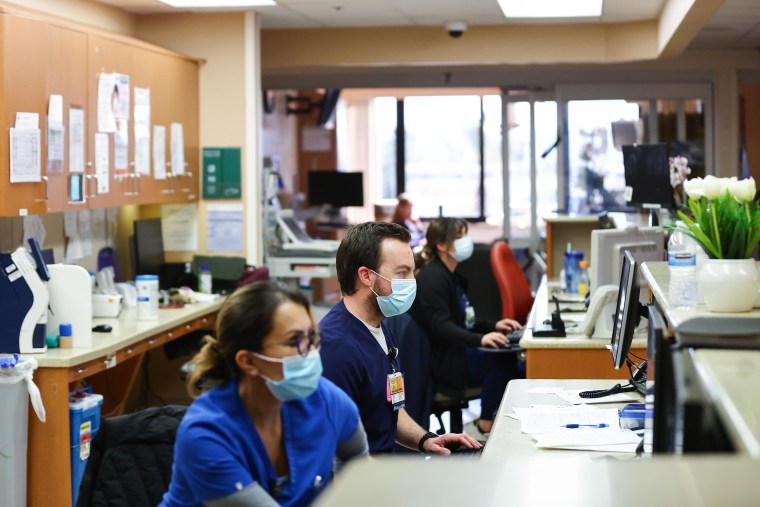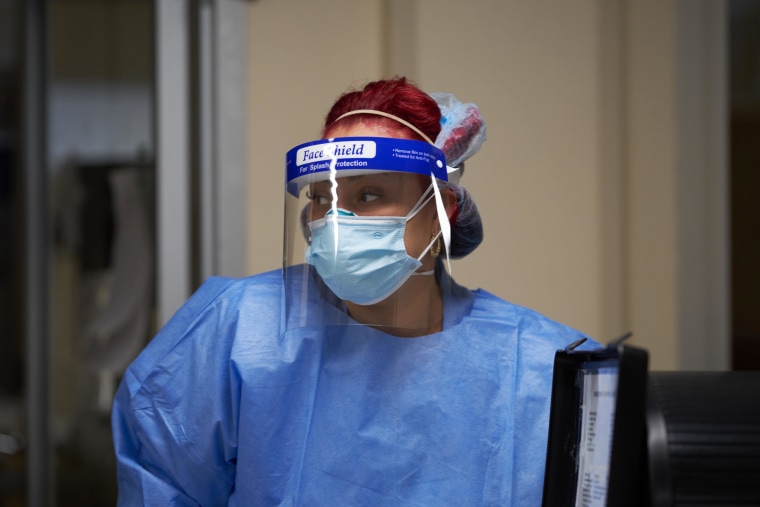As the flu and RSV (respiratory syncytial virus) have spread rapidly this fall — inundating and overwhelming hospitals and their staff across the country — Covid has not.
In fact, Covid-related deaths and hospitalizations have fallen in recent months, despite the emergence of new omicron subvariants that evade immunity from previous infections and vaccination.
Full coverage of the Covid-19 pandemic
According to NBC News data, Covid deaths have fallen consistently since Aug. 31, when the seven-day average of daily Covid deaths was at 571. A month later, on Sept. 30, the number fell to 475. By Halloween, 365 were dying per day, on average, from Covid.
As of Nov. 14, the number had fallen to 316.
What's more, the Centers for Disease Control and Prevention is expected to release new data on Covid-related mortality this week, finding that death rates began to decline in March 2022.
The overall hopeful sign of declining deaths could indicate yet another new Covid phase, doctors suggest. Fewer people sick enough to be hospitalized with Covid means that fewer people are dying of the illness.
The average number of Covid hospitalizations per day has decreased by 27.9% since Aug. 28, according to NBC News data.
Even better, Covid, it seems, is no longer sending a majority of patients into intensive care units.
"There has not been an increase in patients admitted to the hospital specific for Covid-related disease," said Dr. Hugh Cassiere, director of critical care services at Sandra Atlas Bass Heart Hospital at North Shore University Hospital, part of Northwell Health in New York City.
Patients in his ICU with Covid were admitted with unrelated medical issues, and were subsequently found to be Covid-positive, Cassiere said.
"Not to say that it's gone, but Covid has become a coincidental disease," he said.
Dr. Vin Gupta, a pulmonologist and an affiliate faculty member at the University of Washington in Seattle, attributes the decline in deaths and severe Covid cases to a level of "baked-in immunity," including vaccination, prior infection or a combination of the two.
While Covid-related hospitalizations are not currently increasing, Gupta warns that they could during the winter as immunity, especially from previous infection, diminishes.
"If you had Covid, say six to four months ago, you're going to have less protection against hospitalization than if you were vaccinated," Gupta said. "The duration and the robustness of protection wanes a lot more quickly if all you rely on is natural immunity."
With that in mind, data from the Institute for Health Metrics and Evaluation, a research center within the University of Washington, suggest that Covid hospitalizations and deaths could tick up again in "mid-January at the earliest," said Gupta, a medical analyst for NBC News and MSNBC.
On Tuesday, Dr. Ashish Jha, the White House Covid response coordinator, suggested that it is unlikely we will see another Covid surge this winter.
“We are in a very different place and we will remain in a different place,” Jha said during a meeting of health officials, coordinated by Stat News. He added that he is “living life” like he had in 2019.

Despite the encouraging decline in Covid deaths, another school of thought suggests that Covid has simply morphed into a new kind of fatal illness.
"Before everyone was vaccinated or had been infected, 80 or 90% of Covid looked exactly same. They had terrible pneumonia. They were in the ICU on respiratory support," said Dr. Jeremy Faust, an emergency medicine physician at Brigham and Women's Hospital and an instructor at Harvard Medical School in Boston.
Now, he said, "Covid deaths don't all look the same." While "baked-in immunity" may keep the most severe cases at a minimum, it is clear that Covid can wreak havoc on the body long after the infection has cleared.
"Somebody could have Covid and have a heart attack, and the primary cause of death is listed as a heart attack because that's what really brought them to the hospital," Faust said.
But, he added, "we'll never know to what degree Covid triggered that heart attack."
Follow NBC HEALTH on Twitter & Facebook.

